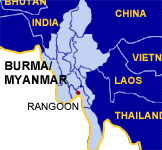
Algeria
Central Africa
Sierra Leone
Zimbabwe
Asia
Burma/Myanmar
Cambodia
Central Asia
Indonesia
Balkans
Albania
Bosnia
Kosovo
Macedonia
Montenegro
Serbia
Issues
EU
HIV/AIDS
Terrorism
Latin America
Colombia
 
|
||||||
Project Overview
The State Peace and Development Council � a group of generals who run the country with an iron fist � say that they wish to return Myanmar to democracy but only when the risk of disintegration subsides. But there has been little progress in this direction since the military reasserted their control in 1990 by refusing to honour the results of an elections won by the National League for Democracy. Intermittent talks between the SPDC and the NLD leader, Daw Aung San Suu Kyi have yet to bear fruit but there is some very cautious optimism of an eventual settlement. ICG�s Myanmar Project aims to examine the policies of the SPDC and the international response to military rule. It also seeks to highlight ways in which the international community may be able to reduce the risks of conflict involved in any political transition, focusing on ethnic conflicts, economic and political reforms and international support.
|

| Myanmar: The Military Regime's View of the World Report 7 December 2001 |
|
| Myanmar: The Role of Civil Society Report 6 December 2001 |
|
| Burma/Myanmar: How Strong is the Military Regime? Report 21 December 2000 |
|
